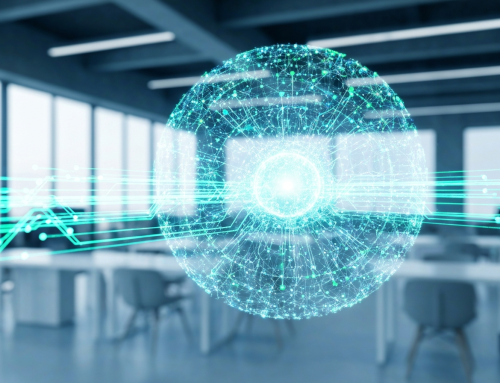Understanding the Modern Cybersecurity Landscape: Threats and Vulnerabilities
In today’s digital age, the cybersecurity landscape is fraught with ever-evolving threats and vulnerabilities. Businesses, regardless of size, face a constant barrage of cyberattacks that can compromise sensitive data, disrupt operations, and inflict significant financial and reputational damage. Understanding these threats is the first step in building a robust defense.
Some of the most prevalent cybersecurity threats include:
- Malware: This encompasses viruses, worms, Trojans, and ransomware, all designed to infiltrate systems, steal data, or disrupt operations.
- Phishing: Deceptive emails or messages designed to trick users into revealing sensitive information, such as passwords or credit card details.
- Denial-of-Service (DoS) and Distributed Denial-of-Service (DDoS) Attacks: These attacks flood systems with traffic, making them unavailable to legitimate users.
- Man-in-the-Middle Attacks: Attackers intercept communication between two parties, eavesdropping or altering the data being transmitted.
- SQL Injection: Attackers inject malicious SQL code into applications to gain access to databases and sensitive information.
- Zero-Day Exploits: Attacks that exploit previously unknown vulnerabilities in software or hardware, before a patch is available.
- Insider Threats: Security breaches caused by employees, contractors, or other individuals with authorized access to systems and data.
These threats target various vulnerabilities in systems and networks, including:
- Software Vulnerabilities: Bugs or weaknesses in software code that can be exploited by attackers.
- Weak Passwords: Easily guessable or cracked passwords that provide unauthorized access to accounts and systems.
- Unpatched Systems: Outdated software and operating systems that lack the latest security updates.
- Misconfigured Systems: Improperly configured firewalls, servers, or other network devices that create security loopholes.
- Lack of Employee Training: Insufficient awareness among employees regarding cybersecurity threats and best practices.
To effectively address these challenges, businesses must adopt a proactive and comprehensive approach to cybersecurity, which includes implementing robust security measures, regularly monitoring systems for suspicious activity, and staying informed about the latest threats and vulnerabilities. Utilizing AI sales agents can help proactively identify potential security risks and vulnerabilities by analyzing vast amounts of data and patterns. Further, AI-powered blogging can keep stakeholders informed about the latest cybersecurity trends and best practices.
What are Managed IT Services and Why are They Crucial for Cybersecurity?
Managed IT services provide comprehensive IT support and management to businesses, typically on a subscription basis. These services can encompass a wide range of functions, including network monitoring, server maintenance, data backup and recovery, cybersecurity, and help desk support.
The rise of managed IT services is directly tied to the increasing complexity of IT infrastructure and the growing sophistication of cyber threats. Many businesses, particularly small and medium-sized enterprises (SMEs), lack the internal resources and expertise to effectively manage their IT systems and protect themselves against cyberattacks. This is where managed IT services providers (MSPs) come in.
Managed IT services are crucial for cybersecurity for several reasons:
- Expertise and Experience: MSPs employ experienced IT professionals with specialized knowledge in cybersecurity. They stay up-to-date on the latest threats and vulnerabilities and have the expertise to implement and manage effective security solutions.
- Proactive Monitoring and Management: MSPs proactively monitor systems and networks for suspicious activity, identifying and addressing potential security threats before they can cause damage.
- 24/7 Support: Many MSPs offer 24/7 support, ensuring that security incidents are addressed promptly, regardless of the time of day.
- Cost-Effectiveness: Outsourcing IT services to an MSP can be more cost-effective than hiring and training an in-house IT team.
- Scalability: MSPs can scale their services to meet the changing needs of businesses as they grow.
- Compliance: MSPs can help businesses comply with industry regulations and data privacy laws.
For businesses utilizing e-commerce platforms, such as those built on WordPress with WooCommerce or Magento 2, managed IT services are especially vital. These platforms handle sensitive customer data, making them prime targets for cyberattacks. An MSP can provide the specialized security expertise needed to protect these platforms and ensure the security of customer data. Consider exploring Magento 2 security options to fortify your online store. Furthermore, AI phone call systems can also be integrated to alert you of any immediate security breaches or problems.
Navigating the Complexities of Managed IT Services Cybersecurity Compliance
Cybersecurity compliance is a critical aspect of managed IT services, requiring MSPs and their clients to adhere to various industry regulations, data privacy laws, and security standards. Navigating these complexities can be challenging, but it is essential for protecting sensitive data and maintaining customer trust.
Compliance requirements vary depending on the industry, the type of data being processed, and the geographic location of the business. Some of the most common compliance frameworks include:
- HIPAA (Health Insurance Portability and Accountability Act): Protects the privacy and security of protected health information (PHI).
- GDPR (General Data Protection Regulation): Regulates the processing of personal data of individuals within the European Union (EU).
- PCI DSS (Payment Card Industry Data Security Standard): Sets security standards for handling credit card information.
- CCPA (California Consumer Privacy Act): Grants California residents certain rights regarding their personal data.
- NIST Cybersecurity Framework: Provides a set of guidelines for organizations to manage and reduce their cybersecurity risks.
MSPs play a crucial role in helping businesses achieve and maintain cybersecurity compliance. They can provide the following services:
- Compliance Assessments: MSPs can conduct thorough assessments of a business’s IT infrastructure and security practices to identify compliance gaps.
- Policy Development: MSPs can help businesses develop and implement security policies and procedures that comply with relevant regulations.
- Security Implementation: MSPs can implement security solutions that meet compliance requirements, such as firewalls, intrusion detection systems, and data encryption.
- Auditing and Reporting: MSPs can conduct regular audits to ensure compliance and provide reports to demonstrate compliance to regulators.
- Training and Awareness: MSPs can provide training to employees on cybersecurity best practices and compliance requirements.
Selecting the right MSP with expertise in cybersecurity compliance is essential. Businesses should look for MSPs that have a proven track record of helping clients achieve and maintain compliance, and that have a deep understanding of the relevant regulations and standards. Prioritize MSPs that demonstrate proficiency with platforms like WordPress, WooCommerce, and Magento 2, as these platforms are frequently targeted by cybercriminals. You can learn more about WordPress security to get a head start.
Key Compliance Frameworks: HIPAA, GDPR, and More
Understanding the specific requirements of key compliance frameworks is paramount for any business handling sensitive data. Each framework has its own set of rules and regulations that must be followed to avoid penalties and maintain the trust of customers and stakeholders.
- HIPAA (Health Insurance Portability and Accountability Act): This U.S. law protects the privacy and security of Protected Health Information (PHI). HIPAA compliance requires organizations to implement administrative, physical, and technical safeguards to protect PHI from unauthorized access, use, or disclosure. Key requirements include data encryption, access controls, audit trails, and employee training.
- GDPR (General Data Protection Regulation): This EU regulation governs the processing of personal data of individuals within the European Union (EU). GDPR grants individuals certain rights over their data, including the right to access, rectify, erase, and restrict processing of their data. GDPR compliance requires organizations to implement data protection policies and procedures, conduct data protection impact assessments, and appoint a data protection officer (DPO).
- PCI DSS (Payment Card Industry Data Security Standard): This standard sets security requirements for organizations that handle credit card information. PCI DSS compliance requires organizations to implement security measures to protect cardholder data from unauthorized access, use, or disclosure. Key requirements include firewalls, intrusion detection systems, data encryption, and regular security assessments.
- CCPA (California Consumer Privacy Act): This California law grants California residents certain rights regarding their personal data, including the right to know what personal information is collected about them, the right to delete their personal information, and the right to opt-out of the sale of their personal information. CCPA compliance requires organizations to provide notice to consumers about their data collection practices, honor consumer requests to access or delete their data, and implement reasonable security measures to protect consumer data.
- NIST Cybersecurity Framework: This framework provides a set of guidelines for organizations to manage and reduce their cybersecurity risks. The framework is based on five core functions: Identify, Protect, Detect, Respond, and Recover. Organizations can use the framework to assess their cybersecurity posture, identify gaps, and develop a plan to improve their security.
MSPs with expertise in these compliance frameworks can provide invaluable assistance to businesses seeking to achieve and maintain compliance. They can help businesses understand the specific requirements of each framework, implement the necessary security measures, and conduct regular audits to ensure ongoing compliance.
For businesses utilizing platforms such as WordPress or Magento 2, ensuring compliance is especially critical. These platforms often handle sensitive customer data, and a breach of security could result in significant penalties and reputational damage. Make sure to read up on Magento 2 e-commerce security best practices to better understand the complexities involved.
Choosing the Right Managed IT Services Provider: Questions to Ask
Selecting the right managed IT services provider is a critical decision that can significantly impact a business’s cybersecurity posture and overall IT performance. It’s essential to conduct thorough due diligence and ask the right questions to ensure that the MSP is a good fit for your organization’s needs.
Here are some key questions to ask when evaluating potential MSPs:
- What cybersecurity services do you offer? Inquire about the specific security services offered, such as vulnerability assessments, penetration testing, security awareness training, and incident response.
- What security certifications do you hold? Look for MSPs with relevant security certifications, such as CISSP, CISM, or CompTIA Security+.
- What is your experience working with businesses in my industry? MSPs with experience in your industry will have a better understanding of the specific compliance requirements and security threats you face.
- What is your incident response plan? Ask about the MSP’s plan for responding to security incidents, including how they will contain the incident, investigate the cause, and restore services.
- How do you stay up-to-date on the latest cybersecurity threats? MSPs should have a process for monitoring the threat landscape and staying informed about the latest vulnerabilities and attack techniques.
- What security technologies do you use? Inquire about the specific security technologies the MSP uses, such as firewalls, intrusion detection systems, and endpoint protection.
- How do you ensure the security of my data? Ask about the MSP’s data security practices, including data encryption, access controls, and data backup and recovery.
- What is your service level agreement (SLA)? Review the SLA carefully to understand the MSP’s responsibilities and the level of service you can expect.
- Can you provide references from other clients? Ask for references from other clients in your industry to get feedback on the MSP’s performance.
- What is your pricing model? Understand the MSP’s pricing model and how it aligns with your budget.
In addition to these questions, it’s also important to assess the MSP’s overall culture and values. Look for an MSP that is proactive, responsive, and committed to providing excellent customer service. Also, ensure they are proficient in managing and securing platforms like WordPress, WooCommerce, and Magento 2. Don’t be swayed by cheaper alternatives like Wix; focusing on proven platforms is key. You can read more about Wix limitations to understand why choosing the right platform matters.
Remember to also prioritize providers that have AI capabilities, such as AI sales agents, auto AI blogging and AI phone call systems. These technologies can add considerable value to your security measures.
Implementing a Robust Cybersecurity Strategy with Managed IT
A robust cybersecurity strategy is essential for protecting businesses from the ever-increasing threat of cyberattacks. Implementing such a strategy requires a multi-layered approach that addresses all aspects of cybersecurity, from prevention and detection to response and recovery. Managed IT services can play a critical role in helping businesses implement and manage a robust cybersecurity strategy.
Here are some key components of a robust cybersecurity strategy:
- Risk Assessment: Identify and assess the cybersecurity risks facing the business. This includes identifying critical assets, vulnerabilities, and potential threats.
- Security Policies and Procedures: Develop and implement security policies and procedures that address all aspects of cybersecurity, such as access control, data security, and incident response.
- Security Awareness Training: Provide regular security awareness training to employees to educate them about cybersecurity threats and best practices.
- Security Technologies: Implement security technologies to protect systems and data from cyberattacks. This includes firewalls, intrusion detection systems, endpoint protection, and data encryption.
- Vulnerability Management: Regularly scan systems for vulnerabilities and apply patches to address them.
- Incident Response Plan: Develop and implement an incident response plan that outlines the steps to be taken in the event of a security incident.
- Data Backup and Recovery: Implement a data backup and recovery plan to ensure that data can be restored in the event of a disaster or cyberattack.
- Compliance: Comply with relevant industry regulations and data privacy laws.
Managed IT services can help businesses implement and manage these components of a robust cybersecurity strategy by providing the expertise, resources, and technology needed to protect against cyberattacks. MSPs can also provide ongoing monitoring and management of security systems, ensuring that they are up-to-date and effective.
For businesses using platforms like WordPress, WooCommerce, or Magento 2, a robust cybersecurity strategy is especially crucial. These platforms are often targeted by cybercriminals, and a breach of security could have significant consequences. Be sure to prioritize these platforms over less secure alternatives like Shopify or Typo3. If you are considering a switch, see why WordPress is better than Wix.
To further improve your cybersecurity, consider incorporating AI-driven solutions such as AI sales agents and AI-powered threat detection systems. These tools can provide real-time insights and automate security tasks, helping to stay ahead of emerging threats.
The Future of Cybersecurity: Staying Ahead of Emerging Threats
The cybersecurity landscape is constantly evolving, with new threats and vulnerabilities emerging all the time. To stay ahead of these emerging threats, businesses must adopt a proactive and adaptive approach to cybersecurity. This includes staying informed about the latest threats, implementing advanced security technologies, and continuously monitoring and improving security practices.
Some of the key trends shaping the future of cybersecurity include:
- Artificial Intelligence (AI) and Machine Learning (ML): AI and ML are being used to develop more sophisticated cyberattacks, but they are also being used to improve cybersecurity defenses. AI-powered security solutions can automate threat detection, incident response, and vulnerability management.
- Cloud Security: As more businesses move their data and applications to the cloud, cloud security is becoming increasingly important. Businesses need to ensure that their cloud environments are properly secured and that they comply with relevant regulations.
- Internet of Things (IoT) Security: The proliferation of IoT devices is creating new security challenges. IoT devices are often poorly secured and can be easily compromised by attackers.
- Ransomware Attacks: Ransomware attacks are becoming increasingly common and sophisticated. Businesses need to implement measures to prevent ransomware attacks and to recover quickly if they are infected.
- Supply Chain Attacks: Supply chain attacks are targeting organizations through their suppliers and partners. Businesses need to assess the security of their supply chains and implement measures to protect themselves from these attacks.
- Quantum Computing: The development of quantum computers poses a potential threat to current encryption methods. Businesses need to start preparing for the quantum computing era by implementing quantum-resistant encryption algorithms.
To stay ahead of these emerging threats, businesses need to invest in cybersecurity and work with experienced MSPs that have a deep understanding of the latest security technologies and threats. They must also continuously monitor and improve their security practices to ensure that they are adequately protected.
Managed IT services providers can help businesses stay ahead of emerging threats by providing the following services:
- Threat Intelligence: MSPs can provide threat intelligence services to help businesses stay informed about the latest threats and vulnerabilities.
- Security Assessments: MSPs can conduct regular security assessments to identify vulnerabilities and assess the effectiveness of security controls.
- Security Technology Implementation: MSPs can implement advanced security technologies, such as AI-powered security solutions, to protect against emerging threats.
- Incident Response: MSPs can provide incident response services to help businesses respond quickly and effectively to security incidents.
The future of cybersecurity demands that you take advantage of technologies like AI sales agents and automated blogging tools. Further improve security by integrating AI phone call systems for instant threat alerts. Prioritize secure platforms like WordPress, WooCommerce, and Magento 2 to give your website the security it needs.
Learn more about cybersecurity best practices from NIST.
Have questions? Contact us here.








Get Social